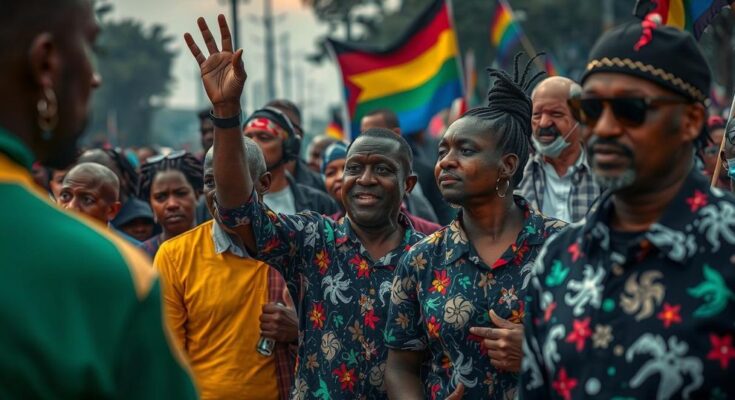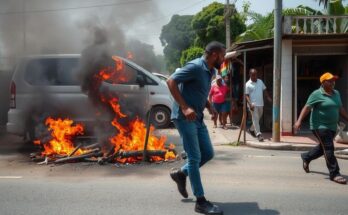Tensions escalate in Mozambique after the assassination of a Podemos party lawyer and official amid disputes over election results favoring the ruling Frelimo party. The Podemos party, contesting the provisional results, has called for a nationwide strike. Allegations of electoral misconduct have plagued the elections, raising concerns for the upcoming protests.
In a tragic escalation of violence in Mozambique, opposition figures were murdered as tensions mount over the disputed election results. On Saturday, gunmen opened fire on a vehicle carrying members of the Podemos party in the capital city of Maputo, resulting in the deaths of Elvino Dias, an attorney for Podemos, and Paulo Guambe, a party representative. The ongoing unrest has raised alarms ahead of anticipated protests against the provisional election outcome, which favor the ruling Frelimo party, despite widespread allegations of electoral misconduct. The Podemos party, bolstered by its presidential candidate Venâncio Mondlane, has taken a firm stance against the provisional results which indicate that Frelimo is likely to secure another term. To express their dissent, Podemos has called for a nationwide strike scheduled for Monday. The civil society election observer group, More Integrity, reported that the assassinations occurred in the Bairro da Coop neighborhood, where approximately 10 to 15 bullets were fired at the vehicle, indicating a deliberate and lethal attack. Adriano Nuvunga, director of the Center for Democracy and Human Rights (CDD), condemned the killings as “brutal assassinations” carried out in “cold-blooded murder”. Meanwhile, Human Rights Watch corroborated the reports of the attack, further highlighting the climate of fear surrounding the elections. Preliminary results suggest that Frelimo is leading in all eleven provinces, with its candidate, Daniel Chapo, expected to win the elections held on 9 October. However, the credibility of these outcomes has been called into question by external observers, who have noted significant irregularities such as vote-buying, intimidation tactics, inflated voter rolls, and a lack of transparency in the election process that has historically marred Mozambican elections since the establishment of democracy in 1994. As the announcement of full results is awaited on 24 October, there are growing concerns that the planned protests on Monday could escalate into violence, given the past instances of security forces responding aggressively towards political demonstrators, particularly following last year’s local elections.
Mozambique has a tumultuous political history characterized by long-standing dominance by the Frelimo party, which has been in power since the country’s independence in 1975. The introduction of multiparty democracy in 1994 has not alleviated issues of electoral integrity, as repeated allegations of fraud, intimidation, and corruption have plagued various electoral processes. The recent electoral cycle has sparked renewed tensions as opposition parties, notably Vamos and Podemos, strive to challenge Frelimo’s authority, culminating in clashes between political factions and concerns about human rights violations. The recent assassination of opposition figures adds a grave dimension to the already fraught political atmosphere amidst the electoral disputes.
The killings of Elvino Dias and Paulo Guambe have exacerbated the political crisis in Mozambique, highlighting the volatility surrounding the recent election results. As Podemos prepares for a nationwide strike in response to perceived electoral fraud, the specter of violent reprisals looms large. With questions about the legitimacy of Frelimo’s electoral victory growing, observers must remain vigilant in advocating for democratic principles and protecting the rights of citizens to express dissent.
Original Source: www.theguardian.com




